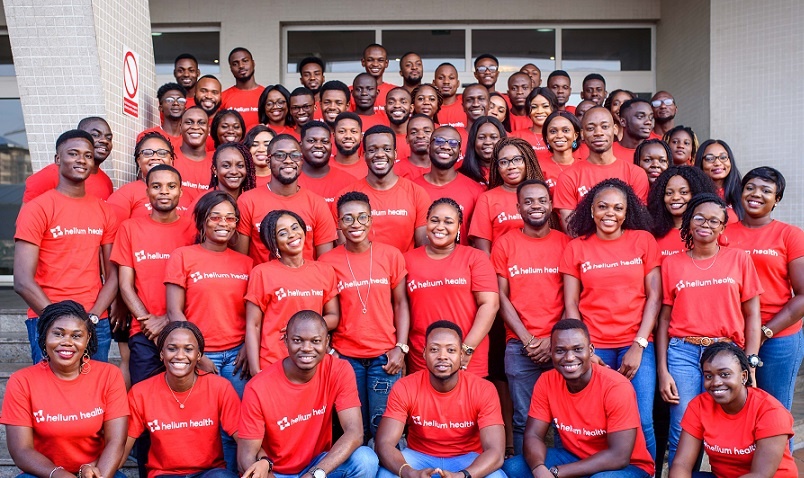Fundraising startups need to apply a discount to their valuation to account for being based in Africa, according to the chief executive officer (CEO) of recently-funded Nigerian e-health venture Helium Health.
Founded in 2016, Helium Health takes hospitals and clinics instantly digital with its flagship Electronic Medical Records/Hospital Management Information System (EMR/HMIS) product, currently in use by more than 300 healthcare facilities in West Africa.
The company this month announced the completion of a US$10 million Series A funding round, led by Global Ventures and Asia Africa Investment & Consulting (AAIC); with participation from Tencent, Ohara Pharmaceutical Co, HOF Capital, Y Combinator, VentureSouq, Chrysalis Capital, Kairos Angels and Flying Doctors Healthcare Investment Company.
Speaking to Disrupt Podcast, CEO Adegoke Olubusi explained that in preparing to fundraise, the startup wanted to avoid a “random valuation like most startups go for”, rather creating a “scientific” valuation model – of approximately 40 pages in length – to arrive at a three tiered valuation system offering a best, medium, and worst case scenario valuation.
“The first thing we did was establish what our assumptions were. What pricing assumptions, what sales assumptions were driving the numbers behind the financial model – things like ‘this is the average amount we were going to charge per hospital’, ‘this is the number of hospitals we’re going to get to’ – because those assumptions drive what’s in the financial model,” Olubusi said.
The startup also created a comparable analysis of similar companies in other markets, what their multiples were on acquisition or IPO, estimated the weighted cost of capital… and applied a discount on account of being an African company.
“We know there are a lot of extenuating circumstances in this market that make it harder for you to use the same multiples as you would in other markets. Things like currency fluctuations, political instability, all those factors, and we decided to account for that and discount accordingly. That way investors would also feel comfortable that we’re taking into consideration those risks, because those risks are definitely higher than in other markets,” Olubusi said.
“I also feel like one of the reasons we did that – we had to do that – is that we know it’s going to be a topic of conversation with every investor, so we ourselves might as well get ahead of it and have a plan around that. In essence it was a form of an Africa discount, it’s something we don’t like, but it’s something we unfortunately have to live with in the near future as a way to mitigate risk when you’re taking it to investors, especially when investors are mostly international or not local to Africa.”
Olubusi believes African startups will have to offer an “Africa discount” in their valuations until enough local companies exist – and do well – to be able to conduct an African market comparison; with enough competition to be able to meaningfully measure startups against each other. The “Africa discount”, he says, is only on offer because not enough proof of exits exist yet.
“If my comparative analysis in my valuation model was using other African companies in the same market, there would be no need for the discount. The problem is that all the other companies you can compare yourself to are in the US or European markets, or different parts of Asia, and that’s a real problem, so as more companies like Helium keep getting more successful, there’ll be less of a need for it.”
With the Series A round secured, Helium Health intends to use the funds for expansion around the continent – to North, East, and Francophone Africa. Kenya, Egypt, and Morocco are the startup’s top three target markets to tackle next.
The company has also been building a suite of new products which it will continue to work on and push out in the coming months. These include a teleclinic product for hospitals, which launched last month, and has seen 300 new hospitals sign up in just three weeks.
“Lockdown is forcing everyone to start seeing patients virtually, and they need software in order to facilitate that. Everything from scheduling to payments, to communication, to the actual consultation – all that, our platform does, so we’re very excited to see that scale,” Olubusi said.
A credit product is also under development, offering instant loans for healthcare providers. The solution will build credit scores for hospitals based on a machine learning model using data the facility inputs when using Helium’s EMR system.
Finally, the startup is working on software for the public sector, specifically around workflow automation and emergency response.
“We think that’s going to be a big deal in the future, especially with the rise of COVID and the need for the containment of outbreaks like Ebola and Lassa Fever around Nigeria and other parts of Africa,” Olubusi said.
There’s a lot to be getting on with, for the 104 people currently making up the Helium Health team. But they’re in no rush. Olubusi says the startup is playing a long term game, and expects it to take 10 to 20 years to arrive at “where we need to be”.
To hear more from Helium Health’s interview with Disrupt Africa, tune in to episode two of Disrupt Podcast, available now via Soundcloud, Spotify, Apple Podcasts, and all other podcasting platforms.


